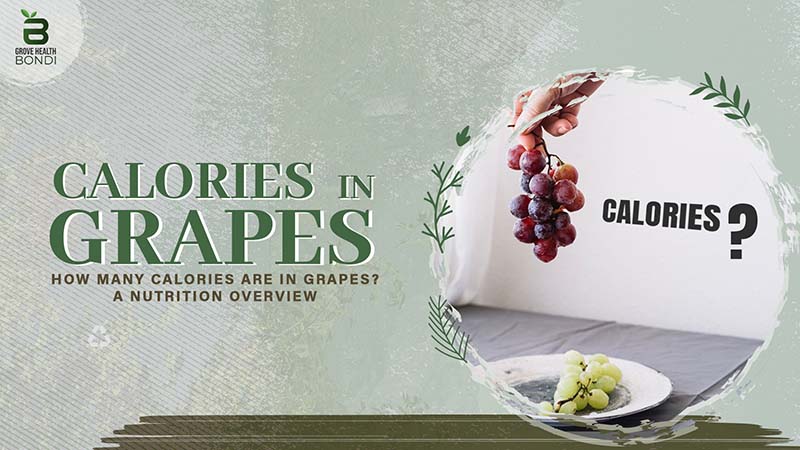Grapes, a fruit loved by many for their natural sweetness, crispness, and a hint of pleasant sourness, are not just delicious but also packed with essential nutrients that boost health. A common question is “how many calories are in grapes?” and whether consuming grapes can aid in weight loss. Join us at Grove Health Bondi as we delve into interesting and useful information about this fruit to better understand its health benefits.

1. Caloric Content of Grapes
Grapes, whether fresh or processed, are a part of the daily diet for many. Here’s information on the calorie content in grapes and grape products:
- Fresh Grapes: A 100g serving of fresh grapes provides about 65 to 70 calories. However, this number can vary based on the grape variety and their ripeness. Typically, green grapes have fewer calories compared to black or red grapes.
- Dried Grapes: When grapes are dried, their calorie content significantly increases, specifically from 240 to 280 calories per 100g. This is due to the drying process reducing the water content, making the nutrients and calories more concentrated.
- Processed Grape Products: Products such as grape juice, wine, grape jam, and grape bread usually contain higher calories than fresh grapes. This is largely due to the processing adding sugar and other ingredients, increasing the total calorie content.

2. Nutritional Value of Grapes
Grapes are not just a tasty fruit but also a rich source of essential nutrients for the body. Here are some of the main nutritional components that grapes offer:
- Water: Grapes contain a significant amount of water, ranging from 75% to 85%, along with other nutrients. Drinking a glass of grape juice can provide up to 70ml of water, helping the body regenerate energy, eliminate toxins, and maintain a stable body temperature.
- Sugar: Grapes contain about 10% to 15% natural sugar, so consuming too much can affect blood sugar levels. People with diabetes should consider their grape intake, limiting it to about 200 – 400 grams per day to avoid a spike in blood sugar.
- Antioxidants: Grapes are a rich source of antioxidants, including lutein and zeaxanthin, which help enhance eye health. The skin of red grapes is particularly rich in resveratrol, myricetin, and quercetin – beneficial phytochemicals in protecting the cardiovascular system and combating the formation of harmful free radicals.
- Vitamins and Minerals: Grapes provide a large amount of vitamins C, E, K, B1, B2, B6, along with minerals such as copper, potassium, and manganese. Copper and vitamin K play an important role in energy production and improving blood clotting, while vitamin B and potassium support growth, development, protein metabolism, and help control blood pressure.

3. Do Grapes Contribute to Weight Gain?
Whether eating grapes can affect your weight depends on the amount of grapes you consume and the total calories you intake daily. Grapes are a sweet fruit, full of vitamins and minerals, but they also contain sugar and calories. If you consume grapes within your daily calorie needs, it won’t lead to weight gain. Conversely, if you overeat grapes and your total calorie intake exceeds your daily needs, you may gain weight.
To maintain a stable weight while still enjoying grapes, you should pay attention to the amount of grapes you eat and ensure it fits within your balanced diet. Additionally, combining this with regular physical activity is crucial to maintain optimal health and weight. This way, you can enjoy the delicious taste of grapes without worrying about weight issues.

4. What are the Benefits of Eating Grapes?
Grapes are an excellent addition to your daily menu as they not only provide energy but are also rich in vitamins, minerals, and water, helping to keep your body hydrated. Furthermore, grapes have the potential to aid in reducing cholesterol, thereby contributing to the improvement of cardiovascular health. These are some of the main benefits that make grapes an indispensable part of a healthy diet.

4.1. Preventing Cardiovascular Diseases
Grapes are a rich source of antioxidants, beneficial in preventing the growth of LDL cholesterol, often known as “bad” cholesterol, which can lead to blockages in the blood vessels. The composition of grapes also includes special enzymes that help reduce the thickening of the blood vessel walls and remove plaque, aiding in blood vessel cleansing and toxin elimination, thereby effectively supporting cardiovascular health.
4.2. Enhancing Brain Function
Grapes are a nutrient-rich fruit with high levels of vitamins, organic acids, amino acids, and glucose, all of which are beneficial in stimulating brain activity. Incorporating grapes into your diet can help improve your brain’s information processing capabilities and may also support in preventing Alzheimer’s disease. Eating grapes can also help alleviate feelings of stress and fatigue and improve sleep quality.
4.3. Anti-Aging Properties
Grapes are an excellent food source for maintaining the beauty of your skin, thanks to the abundance of antioxidants and fatty acids they contain. These components have the ability to help the skin retain its youthfulness, while slowing down the formation of wrinkles, helping you maintain a smooth and radiant complexion.
4.4. Anti-Inflammatory and Cancer Prevention
Grapes contain a large amount of antioxidants, capable of repairing cells damaged by the impact of free radicals. Scientific research has also shown that grapes contain resveratrol, a special active substance beneficial in reducing inflammation and potentially inhibiting the growth of cancer cells in the body.
4.5. Boosting Immunity
Grapes are a rich source of dietary fiber and vitamin C, which help enhance the body’s resistance against cold-causing viruses and strengthen the immune system. Regular consumption of grapes can also assist in preventing the growth of harmful E.coli bacteria, contributing to the protection of your health.
5. How Many Grapes Should You Eat Daily for Weight Loss?
Nutrition experts suggest that for weight loss support, you can consume between 200 and 400 grams of grapes daily. However, the suitable grape intake may need adjustments based on:
- Physical activity: If you’re frequently involved in physical exercises, you’ll expend more energy, and thus, you might be able to eat slightly more grapes without hindering your weight loss objectives.
- Specific weight loss targets: If you’re aiming for swift weight loss, it might be necessary to decrease your grape intake.
- Health conditions: If you’re dealing with health concerns like diabetes or heart diseases, it’s advisable to consult with your physician to identify the optimal grape quantity for your diet.

6. Effective Ways to Eat Grapes for Weight Loss
To support your weight loss journey, you can leverage the benefits of grapes through the following methods:
6.1. Grape Seed Tea
Grape seeds are rich in antioxidants, beneficial not only for cardiovascular health and skin but also in limiting the growth of fat cells, contributing to maintaining a stable weight. You can make grape seed tea by:
- Collecting grape seeds, washing them clean, and letting them dry.
- Boiling 10 to 20 dried grape seeds for 5 minutes, then enjoying the tea.
- Drinking grape seed tea after meals helps break down excess fat and optimize absorption.
6.2. Combining Grapes and Yogurt
ogurt is rich in probiotics, supporting metabolism and digestion, reducing hunger, and releasing excess fat. Combining grapes with sugar-free yogurt in a dessert can help you lose weight:
- Wash the grapes clean and cut them into small pieces.
- Mix the grapes with sugar-free yogurt.
- Enjoy immediately or chill in the refrigerator for about an hour for a cool treat.
6.3. Green Grape Juice
Green grapes contain a lot of fiber and amino acids, suitable for making a weight loss supportive drink:
- Wash the grapes clean and soak in diluted salt water.
- Extract the juice from the grapes.
- Add ice if desired and enjoy without adding sugar or honey.
- Drink green grape juice 3 to 4 times a week, juicing the whole grape without removing the skin to maximize benefits.

7. Things to Keep in Mind When Eating Grapes for Weight Loss
Grapes are a good choice for weight loss due to their low calorie content and richness in vitamins, but to achieve optimal results, you need to consider the following points:
- People with diabetes need to be cautious when eating grapes as the glucose and fructose content can affect blood sugar levels. Pregnant women should also limit their grape intake to avoid the risk of gestational diabetes.
- As grapes have a laxative effect, those with sensitive or weak digestive systems should limit their grape intake to avoid diarrhea.
- Overconsumption of grapes can lead to a sudden increase in fiber intake, causing digestive disorders.
- People with dental issues need to be careful when eating grapes as the natural sugars in grapes can affect tooth enamel. It’s recommended to brush your teeth after eating to protect your teeth.
- Avoid combining grapes with milk, seafood such as shrimp and crab, and potassium-rich foods to avoid unwanted interactions.
- Eat the entire grape, including the skin, to absorb all the nutrients.
- Avoid drinking water immediately after eating grapes to prevent diluting stomach acid, helping the body better absorb nutrients.
- As per expert recommendations, consume about 200 – 400g of fresh grapes daily to support weight loss without affecting your health.
8. Conclusion
This article aims to give you a holistic view of the calorie count in grapes, and a deeper understanding of whether grape consumption can cause weight gain. It also explores various strategies for using grapes to support your weight loss process. For optimal weight loss results with grapes, it’s essential to be patient, maintain a balanced diet, and exercise regularly. Always bear in mind, the question, “how many calories are in grapes?” is a vital one in determining the grape quantity that fits your weight loss objectives.
>> See more related articles:
1. How Many Calories Are In An Apple? Answers From Experts
2. How Many Calories in an Egg? Gain or Lose Weight?
3. How Many Calories in a Banana? Classification and Comparison

